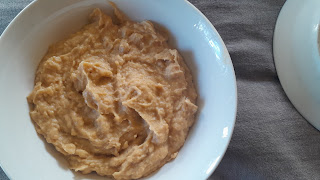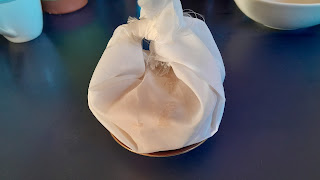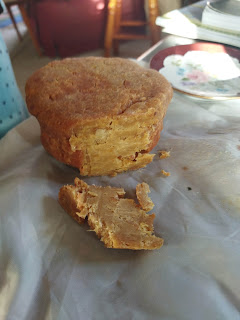Back in the day when my niece went vegan I had a go at making vegan cheese. I ended up with a nice savoury spread (mostly made of cashews and nutritional yeast), but it wasn't much like cheese! I never tried it again as it didn't seem hugely worthwhile.
However, I've recently seen that people are now making vegan cheese that's:
- made from vegan milks (rather than from ground nuts), so is more likely to have a cheesey texture
- uses probiotics (so it's actually fermented and is more likely to taste right)
- AND some of them are using affordable ingredients for the base (like sunflower seeds or chickpeas) rather than cashews (which are pretty expensive - especially if you choose the ones produced without child labour and with decent health and safety provisions for the workers).
So in late April I started my first batch of chickpea aged cheese (i.e. fermented like dairy cheese, but vegan), and 9 weeks later (!) I had my first cheese.
I followed the recipe, which called for shea butter as one of the ingredients. I've decided I don't like the shea butter taste that is still very present in the final product, but on the whole I'm pleased with the result. On it's own I find the shea taste too strong, but it worked well on ratatouille :-)
I've got another batch that I need to start checking on from tomorrow. That one's made with refined coconut oil and olive oil, rather than shea and canola, and also uses a different ratio of firm and liquid fats from that in the original recipe (both changes designed to better match the kinds of fats present in dairy). After I see how that's turned out I want to start a new batch - likely using the ratio of firm:liquid fats in the original recipe, but using the types of fats I used in the second batch.
In the meantime I've tried making a strained yoghurt cheese (like quark or labneh) from sunflower seed milk. It came out surprisingly similar to dairy yoghurt cheese, and has encouraged me to try making fermented cheese from plant-based milk (the current one doesn't start from chickpea milk, but from whole cooked chickpeas). I'm thinking to use chickpea milk, and try curdling it with gypsum (as I've used that to curdle soy milk in the past). However, at least with soy, the milk needs to be boiling for it to curdle. My fermenting bugs won't survive those temperatures, meaning I can't add them to the milk at the start as you do for dairy cheese - I'm hoping just blending them into the curds instead will work OK. I can't find any recipes on the internet for what I'm trying to do next, so I'll just be winging it :-)
Here's some more pictures of the aged chickpea cheese process:
 |
| Ingredients - for both aged chickpea cheese and sunflower seed labneh |
 |
| The chickpea cheese mix ready to start its curing process |
 |
| In its ricotta mould to dry out for a couple of days |
 |
| Looking more solid now - after this it was turned daily (in the fridge) for about a fortnight |
 |
| Ready to be wrapped in cheese cloth (i.e. mesh from our old tent) and left in the back of the fridge to cure. |
 |
| I was rather pleased with how well I wrapped it - the second one wasn't half so tidy! |
 |
| So different after 8-ish weeks curing! |
 |
| It has a distinct 'rind' and centre (with the rind being noticeably stronger in flavour), and is quite crumbly but grates OK. |





No comments:
Post a Comment